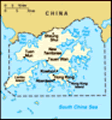Advertisement
Published: September 18th 2013
Today I handed in my tax forms (I love HK tax forms, it was very easy and I didn't have to pay anything). when I came out of the Revenue Building, I came across a protest outside the Immigration Building. Protests are a regular occurrence in HK, there are: Pro-China, Anti-China, Pro-Britain, Anti-falun Gong, Pro-Democracy, Anti-protests... in fact, you name it; Kongers will protest.
But these weren't Kongers. This was a group of domestic helpers; the Tetes, or 'Aunties'.
Their chant, "We are workers! We're not slaves!" may seem a little extreme, but is, in my opinion, more than justified. Two months ago, a football match between Hong Kong and Philippines was marred by HK fans chanting "You're all just slaves!" at their rivals. And this kind of behaviour is not restricted to football hooliganism. It's there on the street, and it is not subtle.
Every family that can afford one, and many can (when I was reading the HK govement website I discovered I could afford to hire one!). They are a status symbol, everyone has one. There are very few children who are not brought to lessons by their Tete. They are usually Filipino or Indonesian
women who come to Hong Kong to look for work. Most nationalities are allowed to stay visa free in HK for 30-120 days. The Tetes are allowed two weeks. This is one of the things the women today were protesting. It is discrimination based on race.
The duties of the Tete range from housework, cooking, taking care or children and the elderly, and anything else their employers asks them to do. Apparently, the Tetes do have rights, but even if they are known, the average Tete is unable to afford to go after their employer with the law, if they complain they are fired, and then they have two weeks to find another employer, after which they are put on a plane back to Philippines. Specifying duties and working hours is another thing they were asking for.
Tetes live with their employers, sleeping in the utility room or with the children in their bedrooms. They are not allowed to rent their own places. They are paid (less than HK$4000, about £350) and are either given food or a small amount of money for that (there is a café in World Wide Plaza that seems to cater solely for the Tetes, cooking very cheap meals that are delicious. I've been a few tiems and they always smile and think it's hilarious that I would go and eat there). Their visas are attached to their employer, they are not supposed to find alternative employment (though I get the impression some do), and if they want to take in extra work, they have to get permission off their employers first. They cannot apply for residence, there were court cases this year and last which argued for their residency. The courts decided that, regardless of how long they have been living and working here (in some cases over twenty years), the domestic helpers did not have the right to abode. For a gwailo like myself, seven years is all it takes.
Most Tetes I meet are young women, but their some older ones who have usually been here for many years. Many have children, siblings or parents who they are supporting. Others come because there are better employment opportunities here than back home.
Kongers don't generally have big flats, and even within a two bedroom flat, you may find a couple with a couple of children and a Tete or two. It is not uncommon for children (the eldest I know of is ten) to sleep in the same bed as one or both of their parents. Some of the Tetes have the delightfully named 'helper's cot' to sleep on.
Before and after school, Tetes carry the children's bags as the children march ahead of them (anywhere between 5 and 20 feet), they speak disrespectfully to them, and I have seen children hitting their Tetes. Many Tetes seem uninterested in their wards, and for the most part, I can't blame them. Many children here are self-centered and feel like they can act however they please.
That's not to say that some of the children love their Tetes, and the Tetes feel genuine affection for the children in their care. There are always the slightly depressing lessons with the small children which include the questions "Do you hug mummy?" No. "Do you hug daddy?" No. "Who do you hug?" Tete.
On Sundays, you can't move for Tetes; they occupy all public space. It is their only day off. Many go to church, then congregate en masse in the parks and walkways, having picnics, talking, gossiping, dancing, singing, having group discussions, and all sorts. The children I teach don't go to the parks on Sundays. Why not? There are too many helpers there.
football racism:
http://www.scmp.com/sport/soccer/article/1253904/football-hooliganism-hong-kong-filipino-fans-claim-racial-abuse?page=all Tete residency:
http://www.scmp.com/news/hong-kong/article/1199312/hong-kongs-top-court-rejects-domestic-helpers-appeal-permanent?page=all
Advertisement
Tot: 0.466s; Tpl: 0.011s; cc: 11; qc: 50; dbt: 0.1827s; 1; m:domysql w:travelblog (10.17.0.13); sld: 1;
; mem: 1.1mb







